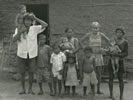Eye For Film >> Movies >> Garapa (2008) Film Review
This emotive exploration of malnutrition and deprivation in one of the poorest parts of Brazil is a powerful critique of food distribution (or lack thereof) from rich to poor and a valiant attempt to highlight the plight of three families living below the poverty line, who are part of the much wider problem of starvation and malnutrition within Brazilian society.
Winner of the Golden Bear 2008 in Berlin, José Padhila is no stranger to tackling tough subjects, following his unflinching portrayal of police brutality and corruption in The Elite Squad. He begins Garapa in the same combative style, informing the viewer at the outset that there are two distinct ways of dying from hunger-related illness. The first is total starvation (a death which speaks for itself) and the second is malnutrition, which gradually eats away at its victim, affecting them both physically and psychologically - particularly debilitating for growing children. It is poverty and this lack of basic nutrition which this documentary focuses on.

Set in a country where so many families live on or below the poverty line, Padhila's film follows the daily lives of three such families, demonstrating how the problem of malnutrition is exacerbated by the Catholic attitudes towards contraception. It is unforgivable that so many families are exposed to such a poor quality of life; in a truly heartbreaking scene one mother explains how, under these poverty-stricken conditions, children become a burden – a curse rather than a blessing.
Garapa is the Brazilian/Portuguese term for the juice of raw sugar cane (relatively cheap and one of the few foods readily available to the poorest families), which forms an unpleasantly high percentage of the diets of those living below the poverty line. Some families are ‘fortunate’ enough to receive money from the Zero Hunger programme ($50 for the poorest families), but this only covers them for about 12 days of very basic food in one calendar year. One of the families in the documentary has not even this crumb of comfort to cling to and the viewer is left with the overwhelming impression that some of the children simply will not make it.
The cinematography throughout is pretty harrowing, with the film shot in a grainy black in white which couldn’t be further from the HD digital colour we’ve come to expect as the norm. There’s no doubt that the director wants to emphasize the difference between the high definition of the 21st century and the black and white of this other version of reality which bears absolutely no resemblance to the contemporary Western world.
Overall, this is a powerful and moving documentary, which appears to give a thorough and frank portrait of its subjects and the impact of poverty and malnutrition upon their lives, making its point effectively without resorting to melodrama. However, my one substantial criticism of the film would be the length. At 110 minutes the format feels slightly laboured, given that there is no particular development or goal to which it is heading. Essentially this is a simply an exploration of daily reality for these unfortunate families and the film’s message and its impact would have been greater in a more concentrated format.
Reviewed on: 09 Mar 2009

















